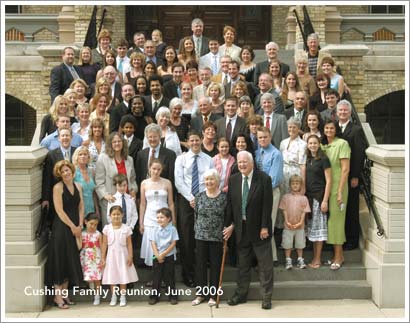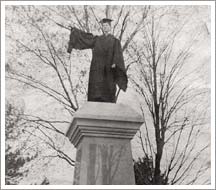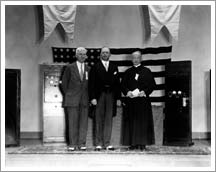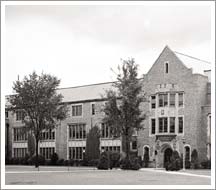Cushing Centennial
Members of the Cushing family gathered on the Notre Dame campus
for a weekend reunion in June 2006. They were also celebrating the
100th anniversary of the graduation of John F. Cushing. A total of
16 members of the family have attended the University.
More than 100 years after he graduated from the University with
a degree in civil engineering, John F. Cushing’s presence is
alive and well at Notre Dame. Students attend classes and work in
many of the laboratories of the John F. Cushing Hall of Engineering
every day. What they may not fully appreciate is Cushing’s
vision of the future — their future. It was one of the reasons
he gifted the University $300,000 toward the construction of a new
hall of engineering.
In a letter to University President Rev. Charles L. O’Donnell,
C.S.C., dated April 16, 1931, Cushing outlined his hopes and purpose
for the donation. He said: “Engineering has written a glorious
chapter in the history of progress in our time. The glory is not
all of the past, it has not all been won. There are still great opportunities
for those prepared to seize them. The field of service, indeed, is
constantly broadening. ... The native genius, inventor or discoverer
is, no doubt, born and not made. But he alone would not get very
far. Our best hope is the high level of professional intelligence
and professional character developed in the colleges and technical
schools of the land. It is there the thought needs to be instilled
that men owe it to their profession not to lay it down, finally,
exactly as it was when they took hold if it, but to pass it on a
finer thing, enriched and advanced and more valuable to the world
because of the use they made of it.
“Being deeply impressed with ‘The Needs of Notre Dame’ ...
and because I find at Notre Dame the conditions that make for the twofold training
of great engineers in all the departments of engineering, ... and because I
feel I owe Notre Dame a debt of gratitude which I can never fully discharge,
I ask you to accept from me a gift of three hundred thousand dollars toward
the erection of a Hall of Engineering to serve the immediate needs of the College
of Engineering and to meet the expectations of older men like me who confidently
look back to Notre Dame to produce the men that are to carry on.”
|
|
Cushing’s
expectations for future students’ leadership and vision were those he had
been living as the fourth president of Great Lakes Dredge & Dock
Company of Chicago. He knew how to plan, and build, for the future.
The Cushing years at Great Lakes were full of significant activity,
which enabled the company to become a leader in the American dredging
industry, with projects such as construction of the foundation for
the Randolph Street Naval Armory in Chicago and building the Peoria
Lock on the Illinois River.
Cushing died
October 7, 1935, when a United Air Lines plane in which he was traveling
crashed near Cheyenne, Wyoming. He had been returning to Chicago
from a business trip on the West Coast. (It is said that several
years earlier — March 1931 — Cushing
had cancelled another flight reservation but that Knute Rockne, Notre Dame’s
football coach at the time, had taken his seat. It was the flight
on which Rockne died.)
As it often
seems when lives are tragically cut short, there is a compelling
story. Cushing’s
is no exception. Born in Arapahoe, Neb., he was the son of a blacksmith.
He worked his way through the University of Nebraska at Lincoln,
spending two years there, and then entered Notre Dame.
At the end
of his junior year, Cushing apparently told President Rev. Andrew
Morrissey, C.S.C., that he would be unable to return for the final
year due to a lack of funds. Morrissey told him not to worry about
the money, that he was to come back and finish his studies. Cushing
graduated from the University in 1906. He began work for Great Lakes
shortly after that and, by 1922, was named president of the company.
John F. Cushing’s
children, grandchildren, and great grandchildren celebrated the 100th
anniversary of his graduation from the University during a family
reunion in June 2006. Of the 115 descendant families contacted, 100
family members were able to attend.

A
total of 16 family members have attended the University. In addition
to John F. Cushing, they are: Paul J. Cushing (B.S., CEGEOS ’31);
Jerome J. Cushing (B.S., CEGEOS ’35); Gregory P. Cushing (B.S.,
AME ’39); Vincent J. Cushing (B.S., Physics ’45; M.S.,
Mathematics ’46); Robert P. Cushing (B.S., Commerce ’58);
Paul J. Cushing Jr. (B.S., CEGEOS ’59); Vincent J. Cushing
Jr. (B.S., EE ’70); David J. Cushing (B.S., EE ’73);
Brian J. Cushing (B.A., Economics ’75); Michael F. Cushing
(B.S., Physics ’80);
Daniel P. Cushing (B.S., EE ’81); James R. Braun (B.S., AME ’86);
Elizabeth A. Cushing (B.F.A., Art Studio ’02); Erin C. O’Brien
(B.A., Psychology ’03); and Kenneth A. Cushing, who will graduate
in May 2007 with a bachelor’s degree in psychology. Although
he did not attend the University, James T. Cushing served as a professor
of physics and philosophy at Notre Dame from 1966 until his death
in 2002.
|





